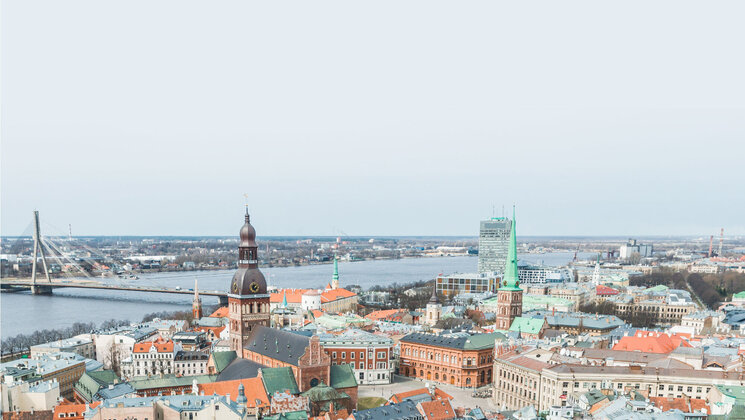The Tenth International Tartu Conference on Canadian Studies

On 8-9 October, the University of Tartu organises the 10th International Tartu Conference on Canadian studies.
The conference marks the 30th anniversary of Canadian Studies in Estonia and the 20th anniversary of the rotating Canadian Studies conferences in the Baltic States. The theme of the conference is "Survival", referring to Margaret Atwood’s ground-breaking literary critical work published in 1972. At the same time, the theme of survival is especially topical today and will be explored from aspects related to society and culture.
The keynote speaker at the conference is the Canadian writer and journalist Michel Jean, in order to pay attention to the Aboriginal Peoples at the time when the themes related to the Aboriginal Peoples have taken centre stage in the discussions concerning society and culture in Canada. As a writer and by using the possibilities of literature, Michel Jean is an important contributor to this process.
During the conference, also a dual photographic exhibition “Two Stages of the Human Life Cycle” by Kristen Dobbin and Toomas Volkmann will be opened that focuses on the young and the elderly Estonian Canadians.
The venue is Lossi 3 Conference Area in the Lobby and the exhibit in the Hallway Gallery will remain open until 19 October.
Conference Committee: Eva Rein (Department of English) and Ene-Reet Soovik (Department of Semiotics). Further information: Eva Rein (eva.rein@ut.ee).
Please see the programme here.
To participate, please register here by Thursday, 6 October at 12:00 AM.

Michel Jean is an Innu writer from Mashteuiatsh, Quebec. His commitment and his Aboriginal roots resonate in his writings. The quest for identity is the key element of his work. He draws from the history of his clan, the memories necessary to highlight that of the First Nations peoples. A reality, a pain, deep scars, too often ignored. Kukum, that recounts the life of his great-grandmother Almanda and the tragedy that struck his people, was the best-selling novel in Quebec in 2021 and the second in 2020.
Recipient of the 2020 Prix France-Québec, the 2020 VLEEL Prize, the 2021 Nature Nomade Prize, the 2021 National Fight for Books of the Société Radio-Canada, the 2022 Prix du Club des Irresistibles des Bibliothèques de Montréal, the 2022 Prix Étincelles Francheville in France, Kukum has been listed by L'Actualité magazine in the prestigious list of 25 novels that have defined Quebec.
His work has been published in 7 countries and translated into Spanish (Tiempo de Papel) into German (Wieser Verlag) and soon into English (House of Anansi).
The Conseil des arts et des lettres made him a Companion of the Ordre des arts et des lettres du Québec, recognizing his remarkable contribution to the development, and promotion of the arts and letters of Québec.
His bibliography totals 10 books, with sales of some 330,000 copies in Quebec. Michel Jean is also an investigative journalist and a TV News anchor, revered and appreciate by audience across the Quebec.
CALL FOR PAPERS
Department of English Studies and Centre for Canadian Studies
University of Tartu, Estonia
Estonian Association for Canadian Studies
with the assistance of Faculty of Arts and Humanities, University of Tartu and Embassy of Canada
THE TENTH INTERNATIONAL TARTU CONFERENCE ON CANADIAN STUDIES
“SURVIVAL”
8-9 October 2022, at the University of Tartu, Estonia
Fifty years ago, Margaret Atwood’s Survival: A Thematic Guide to Canadian Literature was published. This critical work became an introduction to Canadian literature for a wider reading public at home and abroad. While Atwood’s conceptualisation of Canada and Canadian literature in terms of survival has been contested, it has made an important contribution to the debates that have facilitated a better understanding of both.
Today, the concept of survival remains productive, and it can be expanded, also considering Atwood’s 2022 essay collection Burning Questions, to address all living things as well as tackle urgent cultural, social, environmental, political, and economic issues. With this conference, we seek to explore survival from multiple inter/disciplinary and theoretical perspectives of the humanities and social sciences.
The conference also marks the 30th anniversary of the institutionalisation of Canadian Studies in Estonia with the establishing of the Estonian Association for Canadian Studies and the Tartu Conference tradition in 1992. “Survival” as the conference theme is related to the “Arts of Survival,” the artistic concept of the European Capital of Culture Tartu 2024.
While addressing the conference theme, the contexts of the issues in the papers may be current or historical or combine both. We welcome case studies and theoretical papers as well as comparative analyses of Canada and other countries.
The topics of the contributions may include but are not limited to:
- representation of survival in literature and other art forms
- survival of individuals and communities
- survival of languages and cultures
- survival of organisms and life forms
- sustainability of habitats and environments
- geo/political and economic survival
- local and global challenges
- Indigenous Peoples
- migration and multiculturalism
- Baltic diasporas in Canada
- means, resources, and technologies of survival
- Aboriginal Studies, Quebec Studies and Canadian Studies
- concepts, theories, and research methodologies to deal with the topics.
The working language of the conference is English; however, presentations can be made either in English or French. The length of the presentations is 20 minutes plus 10 minutes for discussion. We hope for the participants to be able to be present in person, however, we are planning a hybrid conference to ensure the possibility of online participation.
Contributors are expected to submit an abstract of 250 words as well as a biographical note of 100 words (including title and institutional affiliation) by 10 September 2022.
Please send abstracts and biographical notes as well as possible enquiries via e-mail to Eva Rein (eva.rein@ut.ee).
Conference committee: Eva Rein (Department of English Studies) and Ene-Reet Soovik (Department of Semiotics)





